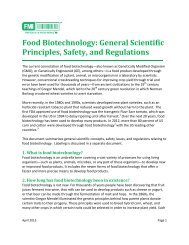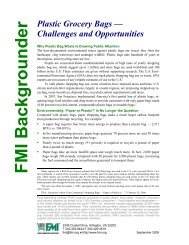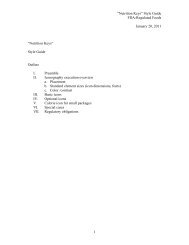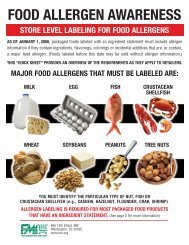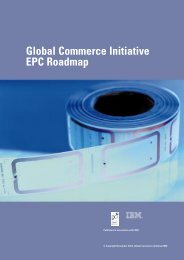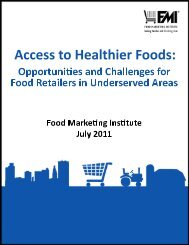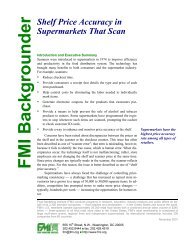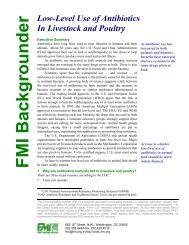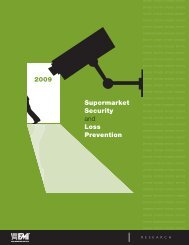Consumer Shopping Habits for Wellness and Environmentally ...
Consumer Shopping Habits for Wellness and Environmentally ...
Consumer Shopping Habits for Wellness and Environmentally ...
You also want an ePaper? Increase the reach of your titles
YUMPU automatically turns print PDFs into web optimized ePapers that Google loves.
Social Networks<br />
<strong>Consumer</strong>s‘ friends <strong>and</strong> family members are a tried <strong>and</strong> true source of wellness in<strong>for</strong>mation. While<br />
social networks are relied upon less than the Internet, in<strong>for</strong>mation from friends <strong>and</strong> family is deemed<br />
the most highly credible source of in<strong>for</strong>mation. Witnessing a friend‘s wellness outcomes provides<br />
context <strong>for</strong> the recommendation. In many cases consumers can ―see‖ the benefits of a<br />
recommended product or practice, heightening the believability of a recommendation. <strong>Consumer</strong>s<br />
consider their friends <strong>and</strong> family members to be very similar to them, so when a friend or family<br />
member has success with a wellness product or activity it seems more likely that the consumer will<br />
have success as well. Lastly, in<strong>for</strong>mation from one‘s social network is considered more credible<br />
because it‘s perceived to be more impartial. Friends <strong>and</strong> family members typically have nothing to<br />
gain personally (i.e. financially) when they make wellness product or activity recommendations; they<br />
have their friend/family member‘s best interests at heart <strong>and</strong> nothing else at stake. <strong>Consumer</strong>s trust<br />
in<strong>for</strong>mation most from sources that care about them.<br />
Some regions lack a strong H+W culture, <strong>and</strong> social networks do not as effectively spread H+W<br />
interest <strong>and</strong> knowledge. For instance, Seattle, with a strong H+W culture that is ingrained into social<br />
networks, is profoundly different from New Jersey where more evolved H+W consumers often lack<br />
an audience. Many consumers lacking strong H+W social networks express concerns over the<br />
effectiveness of natural products, due to ―not knowing anyone who has tried (them).‖ In such regions<br />
or markets, we see opportunities <strong>for</strong> retailers to fill that gap by doing more to encourage<br />
experimentation with new H+W products in-store.<br />
Media<br />
Media other than the Internet are also used as a source of in<strong>for</strong>mation. Oprah <strong>and</strong> National Public<br />
Radio (NPR) were mentioned repeatedly as reliable <strong>and</strong> honest in<strong>for</strong>mants. <strong>Consumer</strong>s perceive<br />
Oprah <strong>and</strong> NPR wellness in<strong>for</strong>mation to be less biased by profit considerations than other major<br />
media sources <strong>and</strong> there<strong>for</strong>e they are deemed more credible. Much of the in<strong>for</strong>mation in newspapers<br />
<strong>and</strong> on television <strong>and</strong> radio is deemed suspect due to numerous conflicting reports of the advantages<br />
<strong>and</strong> disadvantages of a host of wellness products <strong>and</strong> routines <strong>and</strong> due to perceptions of profit<br />
motivated biases in reporting.<br />
31




